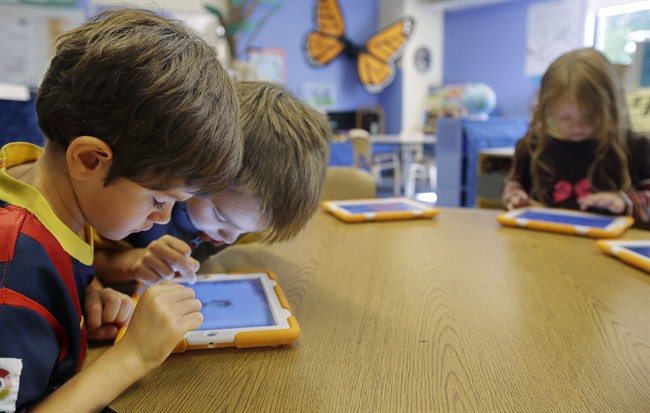“Two more minutes and I’m taking your iPhone, laptop, or TV away.” It’s the warning bell you sound to your kids when their daily screen time is over – a warning bell that could lead to meltdowns.

When you tell your kids you’re pulling the plug on their devices in two minutes, the parenting tactic could cause more harm than help, according to a new study. The researchers warn that the “two-minute” rule only causes tantrums, especially in kids between one and five years old.
It’s not what they thought initially: University of Washington researchers say they were certain the heads-up would make the transition easier.
“We were really shocked – to the point that we thought ‘well, maybe parents only give the two-minute warning right before something unpleasant or when they know a child is likely to put up resistance,’” lead author and postdoctoral candidate, Alexis Hiniker, told the university press.
“So we did a lot of things to control for that but every way we sliced it, the two-minute warning made it worse,” Hiniker said.
READ MORE: Can children become addicted to technology?
Separating from screen time was even more difficult to pull off when kids had features like “autoplay.” That’s when the next episode, or a similar video, will be queued up, tempting kids to keep watching.
- Canadian man dies during Texas Ironman event. His widow wants answers as to why
- Invasive strep: ‘Don’t wait’ to seek care, N.S. woman warns on long road to recovery
- ‘Sciatica was gone’: hospital performs robot-assisted spinal surgery in Canadian first
- ‘Super lice’ are becoming more resistant to chemical shampoos. What to use instead
Hiniker’s team based their findings on interviews and diary entries of 27 families who documented their screen time transitions in detail. The parents of preschoolers and toddlers shared what their kids were watching, on what types of devices, what the adults were doing at the time, and how they chose to end screen time daily.
Nearly 60 per cent of the time, parents said kids had a “neutral” reaction to screen time ending. About 20 per cent had a negative response when their gadgets were taken away.
Some tactics worked better, though: a set routine, turning off the screen at a “natural stopping point,” such as the end of a TV show or a level of a game, or simply when the battery died.
Canadian experts aren’t surprised by the findings: Dr. Oren Amitay, a Toronto-based registered psychologist and Ryerson University instructor, says that adults would react the same way too if we were presented with a two-minute countdown.
Imagine you’re completing a task at work when your boss appears and insists that he’s unplugging your computer within minutes.
READ MORE: Why Canadian docs say too much TV for your toddler could lead to bullying in school
“It’s saying whatever you’re doing is clearly not that important. It’s disrespectful,” Amitay explained.
While it may seem trivial to you, your child could be invested in a game, on a cliff hanger of his or her favourite TV show or even talking to a close friend about an important issue to them.
“To your child it feels arbitrary, and when something suddenly happens like this and your child feels powerless to change it, they’ll naturally resist, withdraw or feel they have no control over their own environment,” Amitay explained.
Ann Douglas, a parenting expert and author of Parenting Through the Storm, and Amitay offer their tips to help parents strategize when it comes to screen time.
Set boundaries at the onset: If your child is getting 30 minutes of screen time on their device, agree to these terms at the beginning before they start. Toddlers and younger children won’t have a good grasp of time management, so it’s your job to explain to them at the 15-minute mark, for example, that half of their time is gone, and then again when they have about five minutes left.
“If kids start reneging, remind them that they made this agreement,” Amitay said.
READ MORE: How much time does your child spend in front of the TV? Officials update recommendations
For younger kids, you could lighten up the situation. Tell them they could drop the iPhone into the pot of spaghetti at the dinner table, or they could be so caught up in their game, they’d miss dessert, Douglas offers.
Carving out parameters both parties agree to will help your child respect the set boundaries, Douglas said.
Establish a routine: If you don’t allow devices at the dinner table, it’s a rule that has to apply to the entire family, adults included, Douglas said. The study points to this, too. Parents might have to deal with a power struggle if their kids wanted extra screen time on the weekend when there was open-ended free time but on weekdays, kids understood that once breakfast was ready, it was time to turn off the TV.
Give your kids a new activity to focus on: When you take away an activity your child was engrossed it, you have to replace it with something else, whether it’s mealtime, homework or playing outdoors.
Explain why screen time is over: If technology was to blame, kids were less likely to be upset, according to the study. If their video was interrupted because the WiFi wasn’t working, they understood the situation was out of their hands. One couple regretted giving their child a TV show to watch on their vacation because he couldn’t watch it at home. Once they explained that the show wasn’t available in the U.S., the fights stopped altogether.
Read the full study here.
carmen.chai@globalnews.ca
Follow @Carmen_Chai


Comments